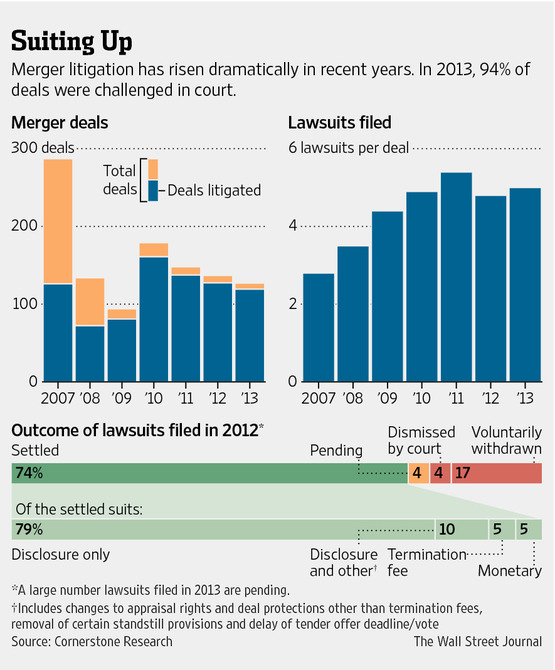|
THE WALL STREET
JOURNAL. |
MARKETS
|
Deals & Deal Makers
First Rule of
Mergers: To Fight Is to Lose
Shareholders Challenged 94% of U.S.
Public-Company Deals Last Year
|
|
By
Liz Hoffman
March 26, 2014 12:06
p.m. ET
Corporate mergers are often fraught with uncertainty over whether the
deal will succeed, culture clashes between the two companies and the
fate of executives.
But two things are virtual locks: The companies will get sued by
shareholders unhappy with some aspect of the deal, and eventually they
will settle with the offended parties without significant changes to
the transaction.
Shareholders challenged 94% of U.S. public-company deals last year, up
from 44% in 2007, according to Cornerstone Research, a litigation
consulting firm. The average deal now faces five lawsuits, often filed
in different state and federal courts.
Lawsuits are among the weapons at shareholders' disposal to hold
boards accountable. But the recent proliferation of legal actions has
diluted their power, people on both sides of these cases say.
"It's a classic case of crying wolf," said Sean Griffith of Fordham
University School of Law. "If the goal of the legal system is to add
value for shareholders, it's failing."
When
Cisco Systems Inc. agreed last July to buy software company
Sourcefire Inc., the first shareholder lawsuit came within three days,
alleging the price was too low. Three more followed in state and
federal court.
The cases settled six weeks later, with Sourcefire agreeing to tell
shareholders more about the deal, including how its bankers deemed
Cisco's $2.7 billion offer fair. It also agreed to pay $400,000 to the
plaintiffs' lawyers. Shareholders got no additional money. The deal
closed in October.
The vast majority of these cases settle as Sourcefire's did, with no
bump in the deal price. Instead, companies agree to disclose more
details and pay shareholders' attorneys' fees, which averaged $500,000
last year, according to Cornerstone. In return, they can close their
merger without the threat of a long court battle.
"It's Kabuki theater," said Robert Daines, a former
Goldman Sachs Group Inc. banker and now a professor at Stanford
Law School. "Everybody knows the moves."
Critics say the system benefits plaintiffs' lawyers, who collect
hundreds of thousands of dollars in fees, and defendant companies, who
get peace of mind for what amounts to a rounding error in deals that
often are valued in the billions.
It is almost always cheaper and less risky for companies to settle,
especially when facing lawsuits in multiple courts. One unfavorable
ruling can derail a deal for months.
The one group that usually doesn't benefit, at least financially, is
shareholders. Out of more than 380 challenged deals since 2011, only
four—about 1%—yielded more money for shareholders in court, according
to Cornerstone. Some critics warn the increase in litigation actually
may hurt shareholders by burying real cases of misconduct in a flood
of filings. "Some good suits get missed," Leo E. Strine, Jr. , chief
justice of the Delaware Supreme Court, wrote in a paper last year.
In some lawsuits, judges have found troublesome behavior. El Paso
Corp. paid investors $110 million after a judge found that conflicts
of interest among the company's management and bankers likely tainted
its 2012 buyout. Similar claims in the 2011 sale of Del Monte Foods
yielded nearly $90 million for shareholders. Neither company admitted
wrongdoing.
Just this month, a judge found that RBC Capital Markets LLC
manipulated the 2011 sale of ambulance operator Rural/Metro Corp. in
an effort to win more fees for itself, a decision that could hand
shareholders millions of dollars. RBC has said it acted properly and
is weighing its options.
Plaintiffs' lawyers note that in other countries, government
regulators review deals for fairness. In the U.S., "nobody is looking
out for shareholders except lawyers," said Mark Lebovitch of Bernstein
Litowitz Berger & Grossmann LLP, which represents investors.
Still, even some defenders of the system say it can and should work
better.
"The plaintiffs' bar has swung too far, and that's a problem," said
Stuart Grant, who represented shareholders of El Paso and Del Monte.
"It hurts shareholders who have good cases."
The flood of filings may be creating odd incentives. Some critics of
companies allege they are deliberately withholding deal details to
have fodder for quick settlements.
The issue cropped up in the recent sale of Mako Surgical Corp. to
Stryker Corp. Mako’s financial projections were missing from the
preliminary packet of information sent to shareholders. Courts
generally have said shareholders are entitled to these numbers.
Plaintiffs' lawyers accused Mako of deliberately holding back the
projections to be able to disclose them later to settle the case. "For
them to play 'hide-the-ball' with the shareholders like this is really
gamesmanship," lawyer Donald Enright said at a November hearing. The
deal closed in December, after Mako made additional disclosures and
agreed to negotiate a "reasonable" fee for Mr. Enright's firm and
others.
Similar claims have been made in other cases. Some have found
sympathetic judges frustrated by what they see as tactical holdbacks.
"You create this situation where the bankers have an incentive to not
put in this stuff," J. Travis Laster, a judge in Delaware's business
court, said in a 2011 hearing.
Some judges have been pushing back against suits they deem frivolous.
The average fee awarded to plaintiffs' lawyers has fallen by nearly
half since 2008, according to Cornerstone.
In other cases, judges have rejected disclosure-only settlements.
Judge Strine in February refused to approve such a settlement over the
sale of Medicis Pharmaceutical Corp. The plaintiffs' lawyers were
seeking $400,000, which Medicis had agreed to pay. But Judge Strine
said the plaintiffs' lawyers hadn't uncovered any problems with the
transaction. "I think at some point in time, you have to candidly say,
'We struck out,'" he said in court.
Write to
Liz Hoffman at
liz.hoffman@wsj.com
|
